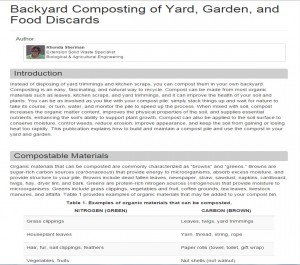Backyard Composting
go.ncsu.edu/readext?322424
en Español / em Português
El inglés es el idioma de control de esta página. En la medida en que haya algún conflicto entre la traducción al inglés y la traducción, el inglés prevalece.
Al hacer clic en el enlace de traducción se activa un servicio de traducción gratuito para convertir la página al español. Al igual que con cualquier traducción por Internet, la conversión no es sensible al contexto y puede que no traduzca el texto en su significado original. NC State Extension no garantiza la exactitud del texto traducido. Por favor, tenga en cuenta que algunas aplicaciones y/o servicios pueden no funcionar como se espera cuando se traducen.
Português
Inglês é o idioma de controle desta página. Na medida que haja algum conflito entre o texto original em Inglês e a tradução, o Inglês prevalece.
Ao clicar no link de tradução, um serviço gratuito de tradução será ativado para converter a página para o Português. Como em qualquer tradução pela internet, a conversão não é sensivel ao contexto e pode não ocorrer a tradução para o significado orginal. O serviço de Extensão da Carolina do Norte (NC State Extension) não garante a exatidão do texto traduzido. Por favor, observe que algumas funções ou serviços podem não funcionar como esperado após a tradução.
English
English is the controlling language of this page. To the extent there is any conflict between the English text and the translation, English controls.
Clicking on the translation link activates a free translation service to convert the page to Spanish. As with any Internet translation, the conversion is not context-sensitive and may not translate the text to its original meaning. NC State Extension does not guarantee the accuracy of the translated text. Please note that some applications and/or services may not function as expected when translated.
Collapse ▲Instead of disposing of yard trimmings  and
and
kitchen scraps, you can compost them in your own backyard. Composting is an easy, fascinating, and natural way to recycle. Compost can be made from most organic materials such as leaves, kitchen scraps, and yard trimmings, and it can improve the health of your soil and plants. You can be as involved as you like with your compost pile: simply stack things up and wait for nature to take its course, or turn, water, and monitor the pile to speed up the process. When mixed with soil, compost increases the organic matter content, improves the physical properties of the soil, and supplies essential nutrients, enhancing the soil’s ability to support plant growth. Compost can also be applied to the soil surface to conserve moisture, control weeds, reduce erosion, improve appearance, and keep the soil from gaining or losing heat too rapidly. This publication explains how to build and maintain a compost pile and use the compost in your yard and garden. For more information see “Backyard Composting of Yard, Garden and Food Discards“.


